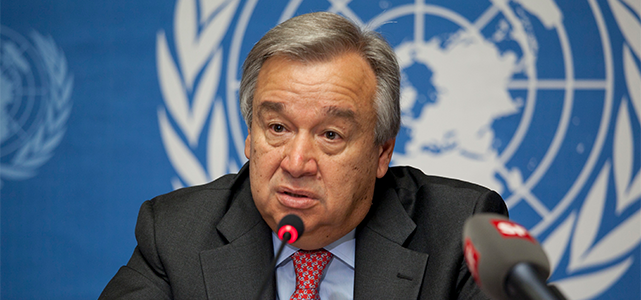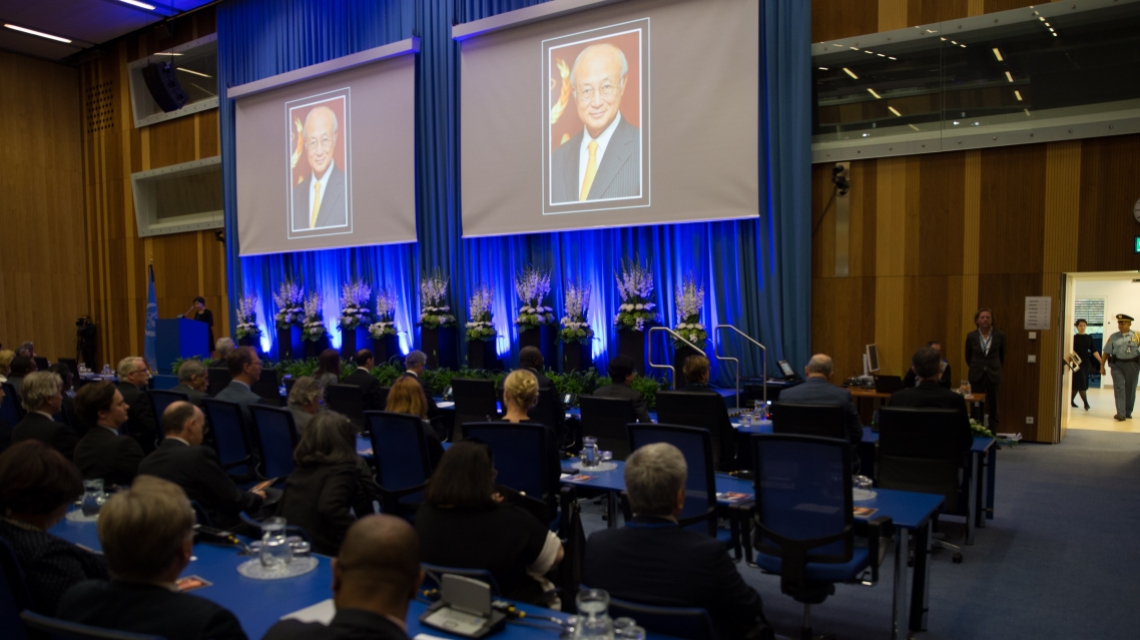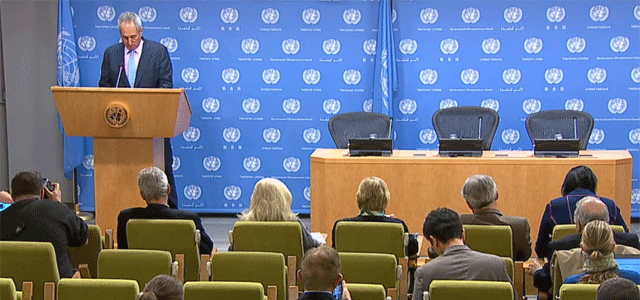The third UN Security Council straw poll on 29 August shifted the informal ranking of most of the current Secretary-General candidates and prompted some curious speculations.
Five candidates lost “encouraging” votes from the previous round, while another candidate gained “encouraging” support that pushed his ranking much higher. This suggested a “coordinated approach” among some Council members in preparation for a qualitative new phase of the selection process.
The remaining four candidates preserved their general level of encouragement, improving the ranking of one as others on the slate fell below her. Within this core of four “stable” candidates, two have receive consistent levels of support and thus may have reached their highest possible level of encouragement, whereas the other two could still move up or down on the ranking list due to possible redistribution between their “discouraging” and “no opinion” votes.
These four are Antonio Guterres (Portugal), Irina Bokova (Bulgaria), Srgjan Kerim (Macedonia) and Helen Clark (New Zealand). Kerim and Clark preserved their “middle-to-low” positions on the provisional ranking list, coming in sixth & seventh place, respectively. Guterres and Bokova maintained their “high-ranking” positions (first & third, respectively). Bokova returned to third place by transforming two discouragements into “no opinion” votes, bringing her back with striking distance of nine “encouraging” votes (as she achieved in the first straw poll) required to be the Council’s nominee.
Miroslav Lajčák (Slovakia) improved his ranking dramatically, from 11th to second place, after gaining seven new “encouraging” votes by managing to transform four “discouraging” and three “no opinion” votes into “encouraging” votes. This surprise development raised speculation as to why this happened, particularly after a previously “high scoring” fellow East European, Danilo Türk (Slovenia), dropped from fourth to eighth place.
Such an unexpected shift is likely to encourage the remaining “low-ranking” candidates—Christiana Figueres (Costa Rica), Natalia Gherman (Moldova) and Helen Clark (New Zealand)—to hold their breath before deciding to withdraw from the race as previously expected. They might also count on some “voting miracles” during the next two straw polls on 9 and 26 September before further, color-coded ballots scheduled for October will start differentiating the critical votes (with a veto right!) of the group of five permanent Council members (P5) from those of the ten non-permanent members. This will mark a qualitatively new phase in the selection process where the usual “horse trading” between P5 preferences will probably prompt more decisively the “low‑performing” candidates to withdraw from the race.
Only Lajčák and Bokova managed to move up during the third SC straw poll. Both of them have the potential to go even higher if they can find a way to transform their “no opinion” votes to the “encouraging” column. These two candidates joining the higher ranking contenders poses a challenge to Antonio Guterres, who is neither East European nor a female – two important selection criteria in the 2016 race strongly supported by Russia and China, both with veto rights. Close behind is yet another Eastern European, Vuk Jeremić (Serbia) in fourth place and Susana Malcorra (Argentine) in fifth.
If the call for the next Secretary-General to be female gains momentum, Bokova’s consistent lead among female candidates would push her to being the eventual nominee. The flexing of “veto muscle” by the P5, notably Russia, China and France, at the straw polls in October might also place Irina Bokova even better within the Eastern European group, leaving behind her male challenges.
However, if the Council continues to lean toward a male nominee, Guterres could still lose out to Lajčák if the “fair regional rotation” criteria gives priority to selection of an Eastern European. In the absence of “inside” information, it remains a matter of speculation as to how and why Lajčák, with much less UN experience, replaced Turk as the male favorite within the Eastern European regional group. One could wonder if the actual reason is that Lajčák, in his capacity as foreign minister of Slovakia being the rotating 6-month president of the European Union, might turn out to be in a position to foster important policy developments advocated by several Council members.
Overall, are these shifts in the rankings tactical and therefore merely temporary as Council members move closer to firm preferences, or might we see yet another significant repositioning on the provisional ranking list? The expected exercise of the veto by one or more P5 members might dramatically change the overall picture in October and start a different type of diplomatic game with strong geopolitical flavor.
The real competition for the next UN Secretary-General position is about to heat up.
| Candidate | 1st Poll – 21 July | ↑↓ | 2nd Poll – 5 Aug | ↑↓ | 3rd Poll – 29 Aug | |||||||||
| # | E | D | N/O | #/strong> | E | D | N/O | # | E | D | N/O | |||
| Guterres | 1 | 12 | 0 | 3 | -1/+2/-1 | 1 | 11 | 2 | 2 | 0/+1/-1 | 1 | 11 | 3 | 1 |
| Türk | 2 | 11 | 2 | 2 | -4/+3/+1 | 4 | 7 | 5 | 3 | -2/+1/+1 | 8 | 5 | 6 | 4 |
| Bokova | 3 | 9 | 4 | 2 | -2/+3/-1 | 5 | 7 | 7 | 1 | 0/-2/+2 | 3 | 7 | 5 | 3 |
| Jeremić | 4 | 9 | 5 | 1 | -1/-1/+2 | 2 | 8 | 4 | 3 | -1/+1/0 | 4 | 7 | 5 | 3 |
| Kerim | 5 | 9 | 5 | 1 | -2/+2/+1 | 6 | 6 | 7 | 2 | 0/0/0 | 6 | 6 | 7 | 2 |
| Clark | 6 | 8 | 5 | 2 | -2/+3/-1 | 7 | 6 | 8 | 1 | 0/0/0 | 7 | 6 | 8 | 1 |
| Lajčák | 7 | 7 | 3 | 5 | -5/+6/-1 | 11 | 2 | 9 | 4 | +7/-4/-3 | 2 | 9 | 5 | 1 |
| Malcorra | 8 | 7 | 4 | 4 | +1/+2/-3 | 3 | 8 | 6 | 1 | -1/+1/0 | 5 | 7 | 7 | 1 |
| Figueres | 9 | 5 | 5 | 5 | 0/+3/-3 | 8 | 5 | 8 | 2 | -3/+4/-1 | 10 | 2 | 12 | 1 |
| Gherman | 10 | 4 | 4 | 7 | -1/+6/-5 | 9 | 3 | 10 | 2 | -1/+2/-1 | 9 | 2 | 12 | 1 |
| Lukšić | 11 | 3 | 7 | 5 | -1/-1/=2 | 10 | 2 | 6 | 7 | N/A | N/A | w/d | ||
| Pusić | 12 | 2 | 11 | 2 | N/A | – | w/d | N/A | N/A | w/d | ||||





